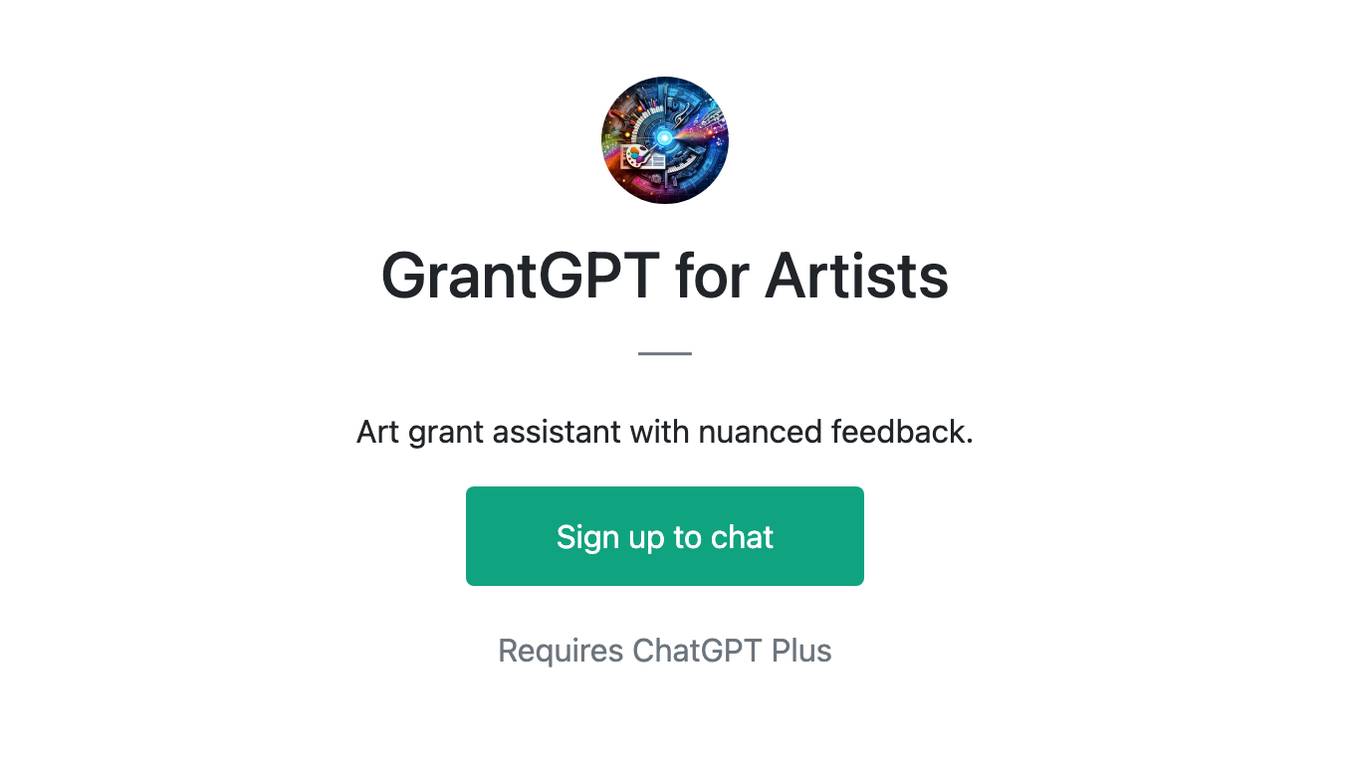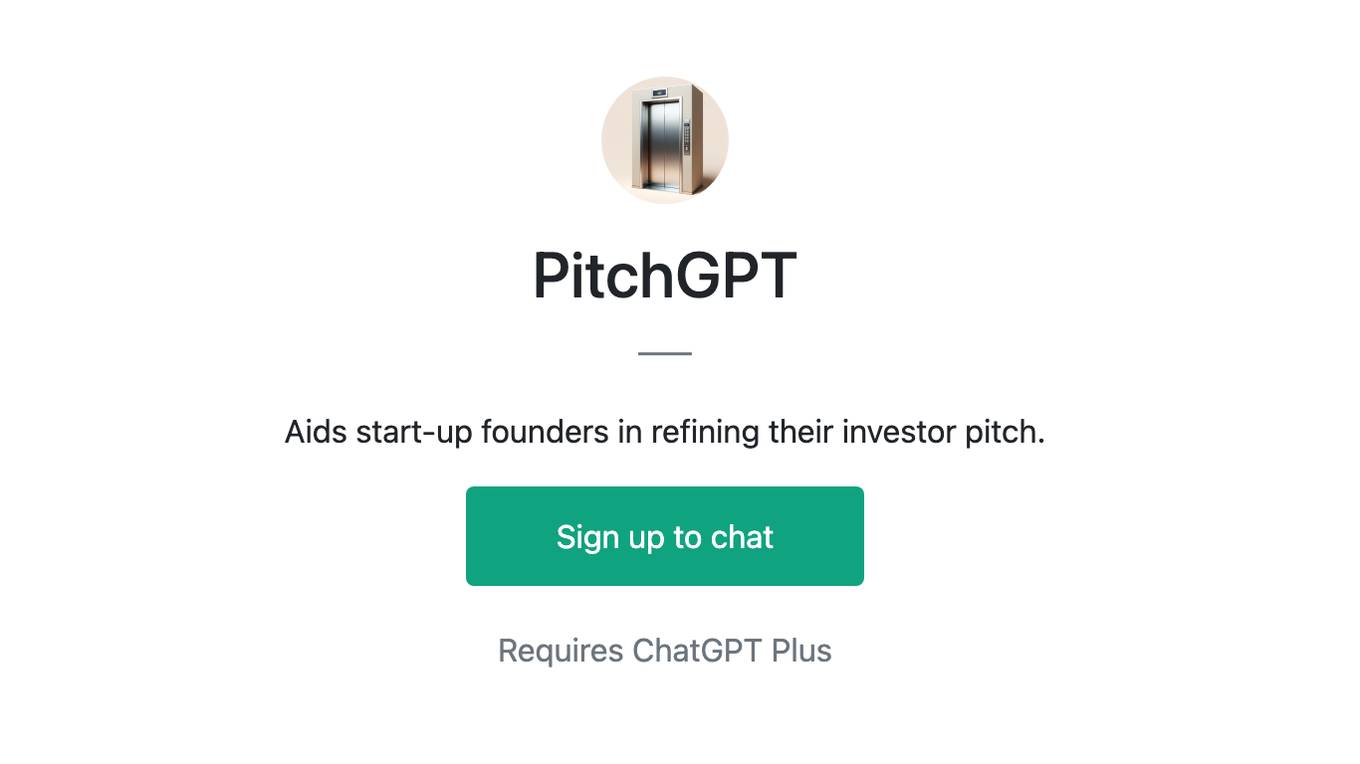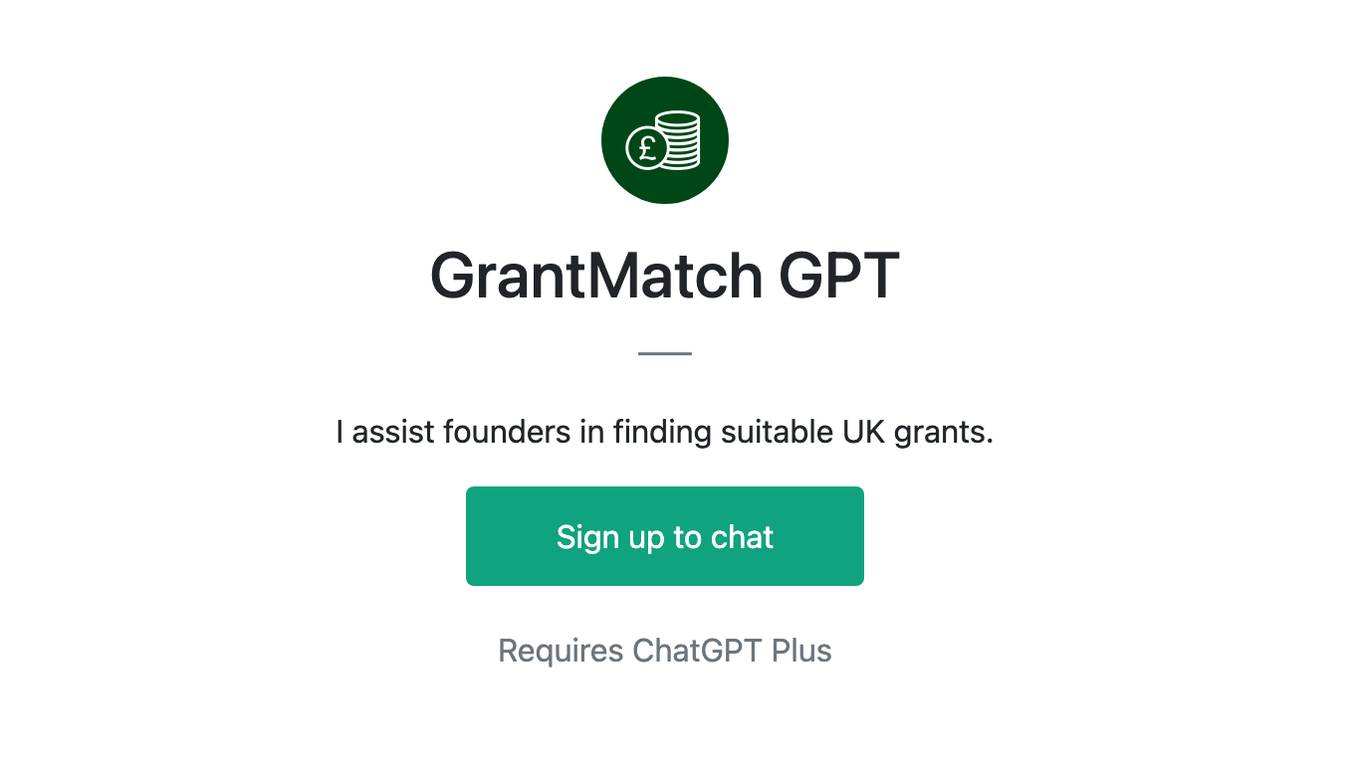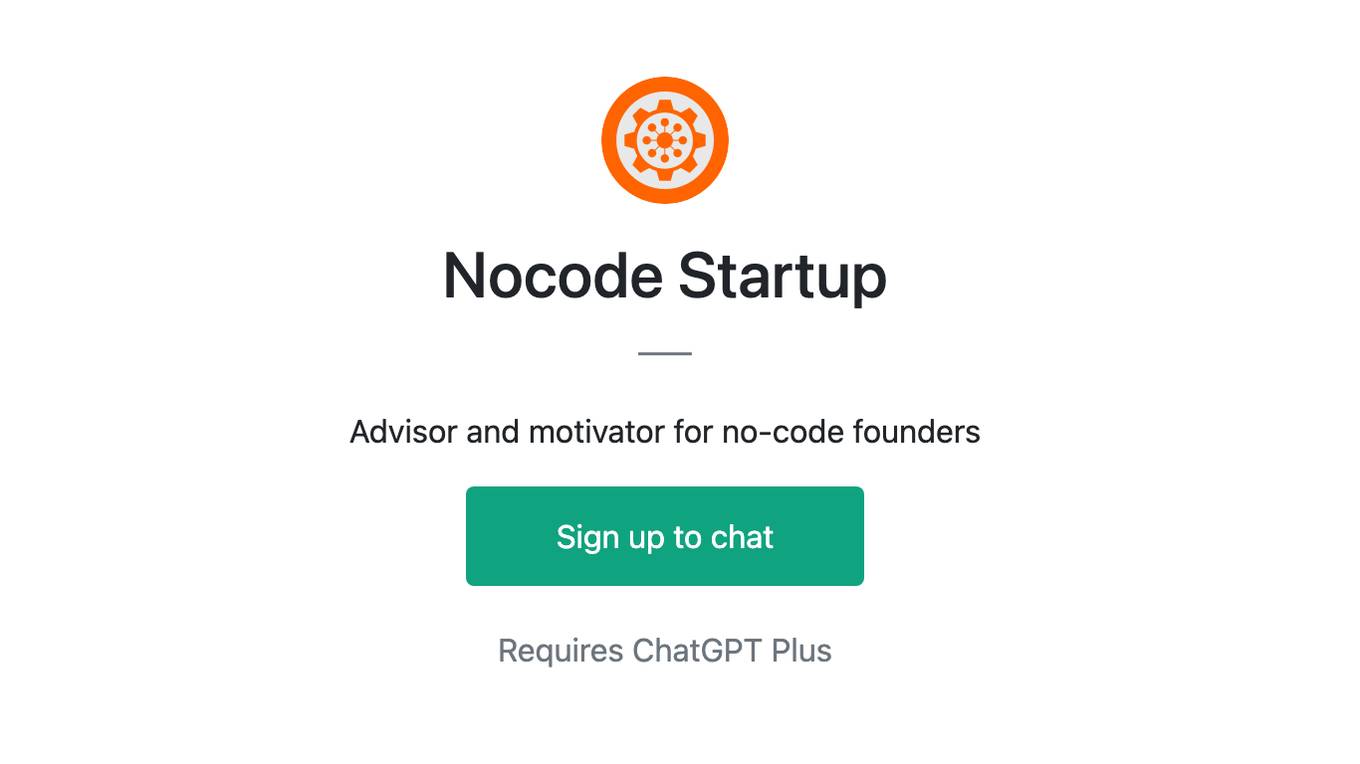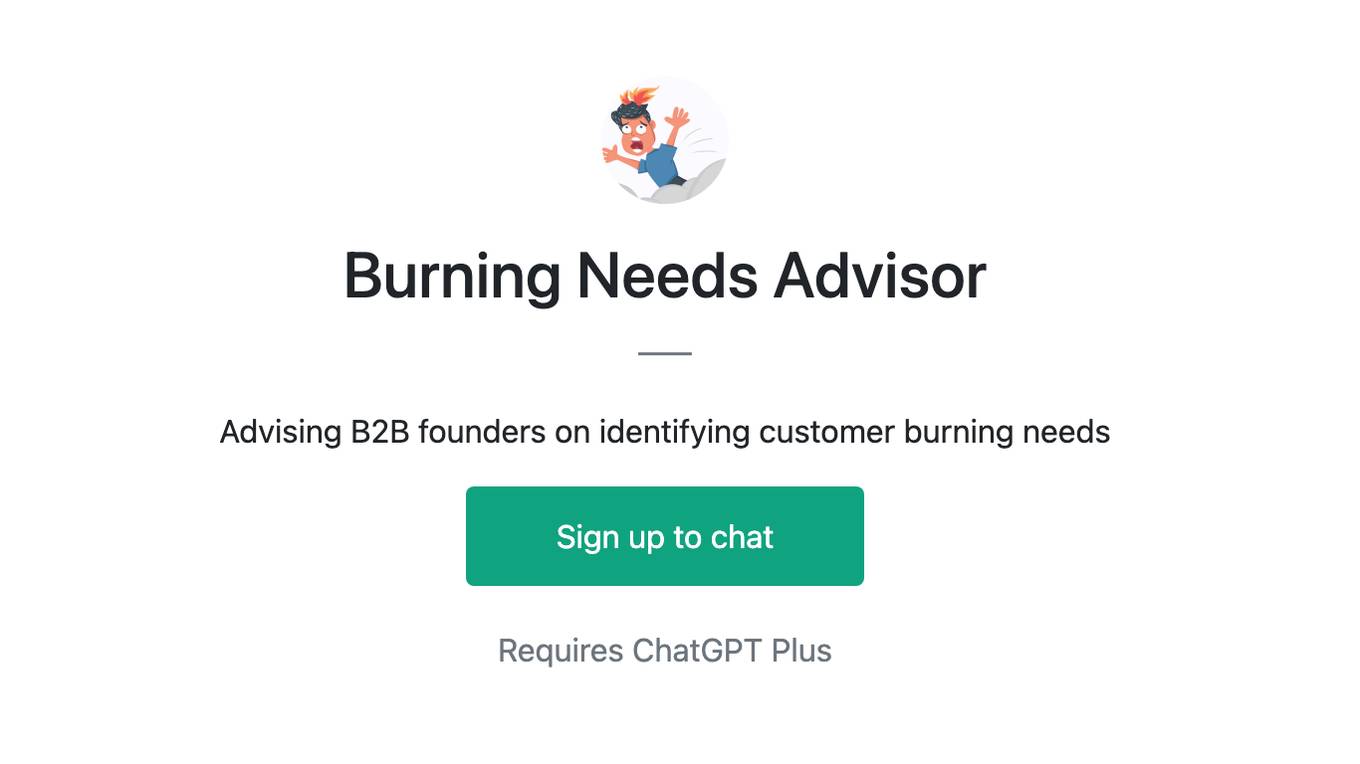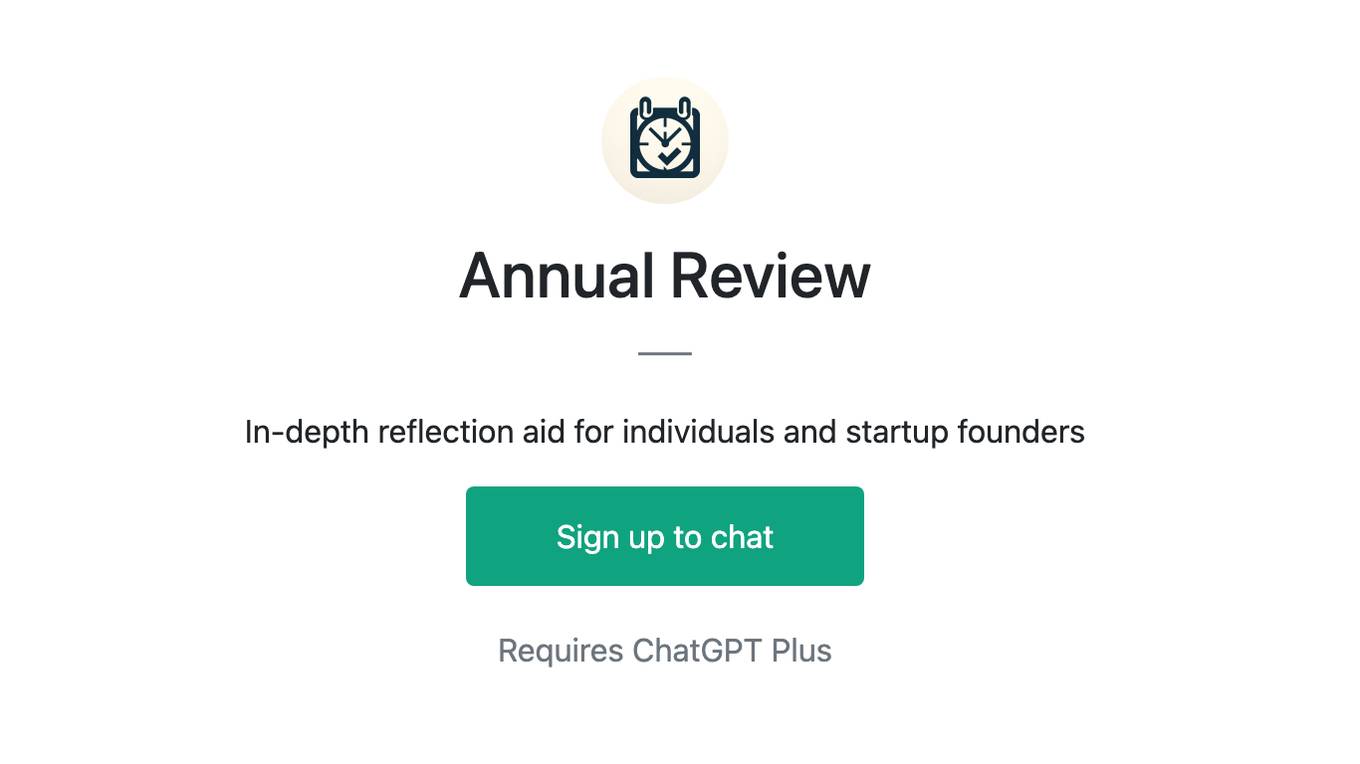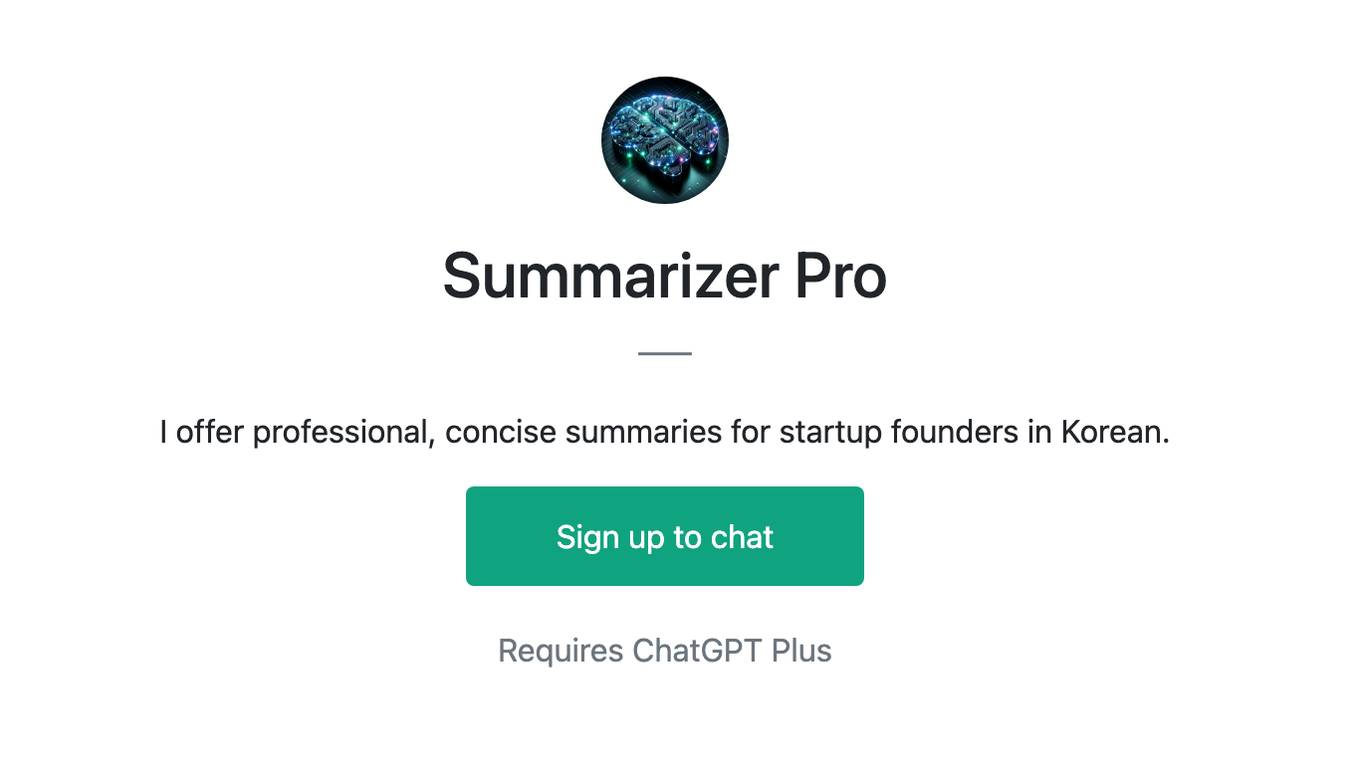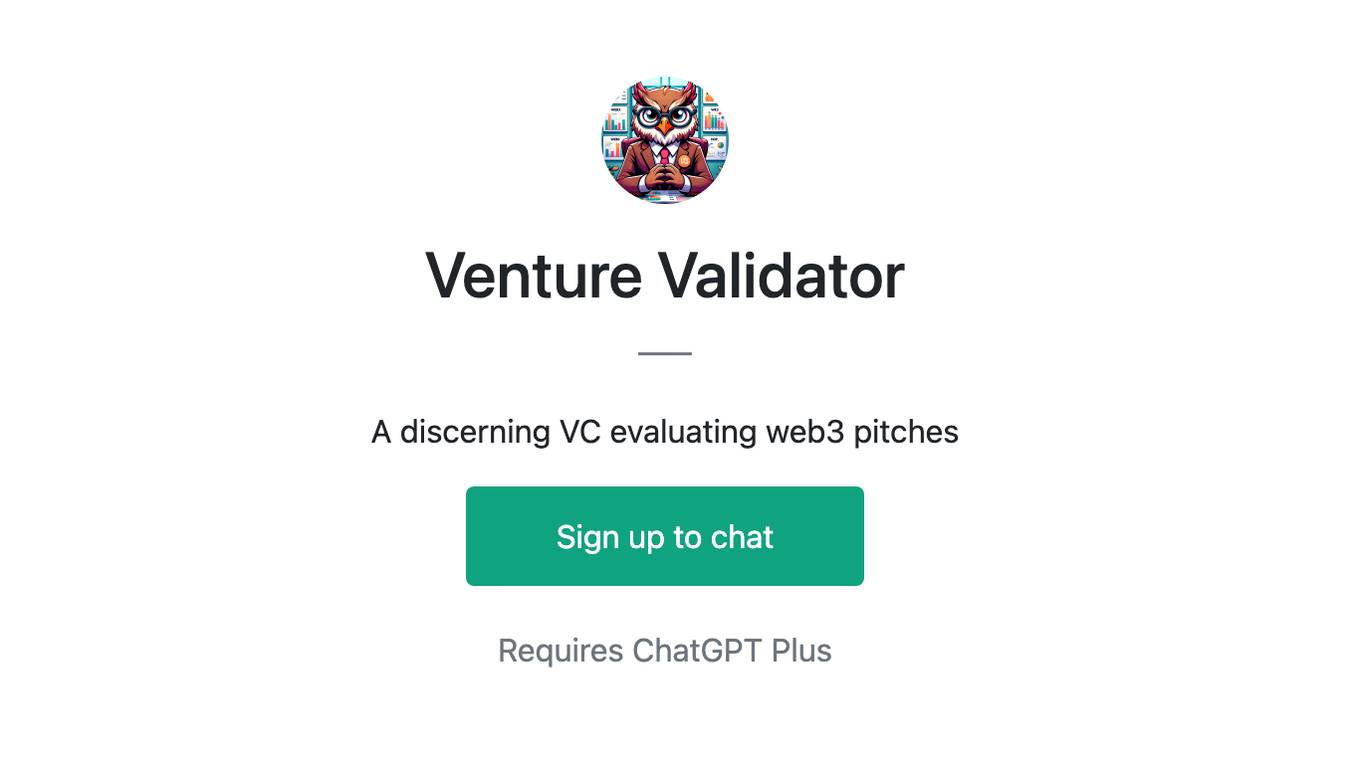Best AI tools for< Funders >
Infographic
20 - AI tool Sites
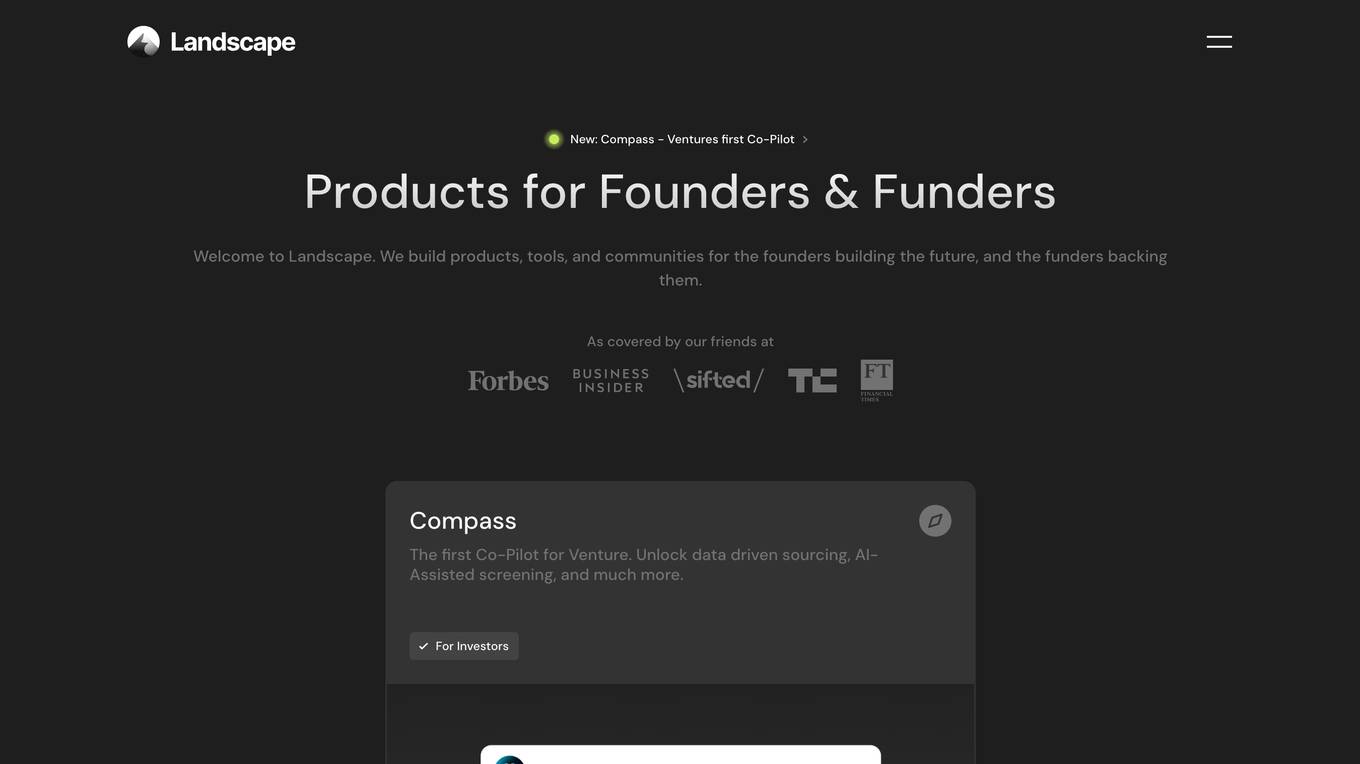
Landscape
Landscape is an AI-powered platform designed to help venture capital firms, angel investors, research teams, and business development professionals discover and analyze early-stage private market companies. By leveraging AI technology, Landscape monitors over 15 alternative data sources to provide signals on potential investment opportunities at the earliest stages. Users can build custom feeds, apply filters, and access backtested data to make informed investment decisions. The platform also offers workflow tools for competitor analysis, market mapping, founder ranking, and operations optimization. Landscape aims to provide a competitive edge by enabling users to identify promising startups before they are widely known in the market.

THE POLICY CHATBOT
THE POLICY CHATBOT is an AI-powered tool that transforms Standard Operating Procedures into a dynamic chatbot, providing instant answers and guidance to users within a company. It allows authorized employees to access and interact with company policies in real-time, enhancing efficiency and accuracy in policy-related queries. The chatbot leverages AI technology to extract information from uploaded PDF SOPs, offering a seamless user experience and freeing up employees to focus on more critical tasks.

Grantboost
Grantboost is an AI-powered grant writing tool designed to help nonprofits secure funding with ease. It uses AI to craft tailored grant proposals that resonate with funders, analyze grant opportunities, and generate customized grant proposal answers based on industry best practices. Grantboost's user-friendly platform and seamless process save time and effort, allowing nonprofits to focus on their mission.
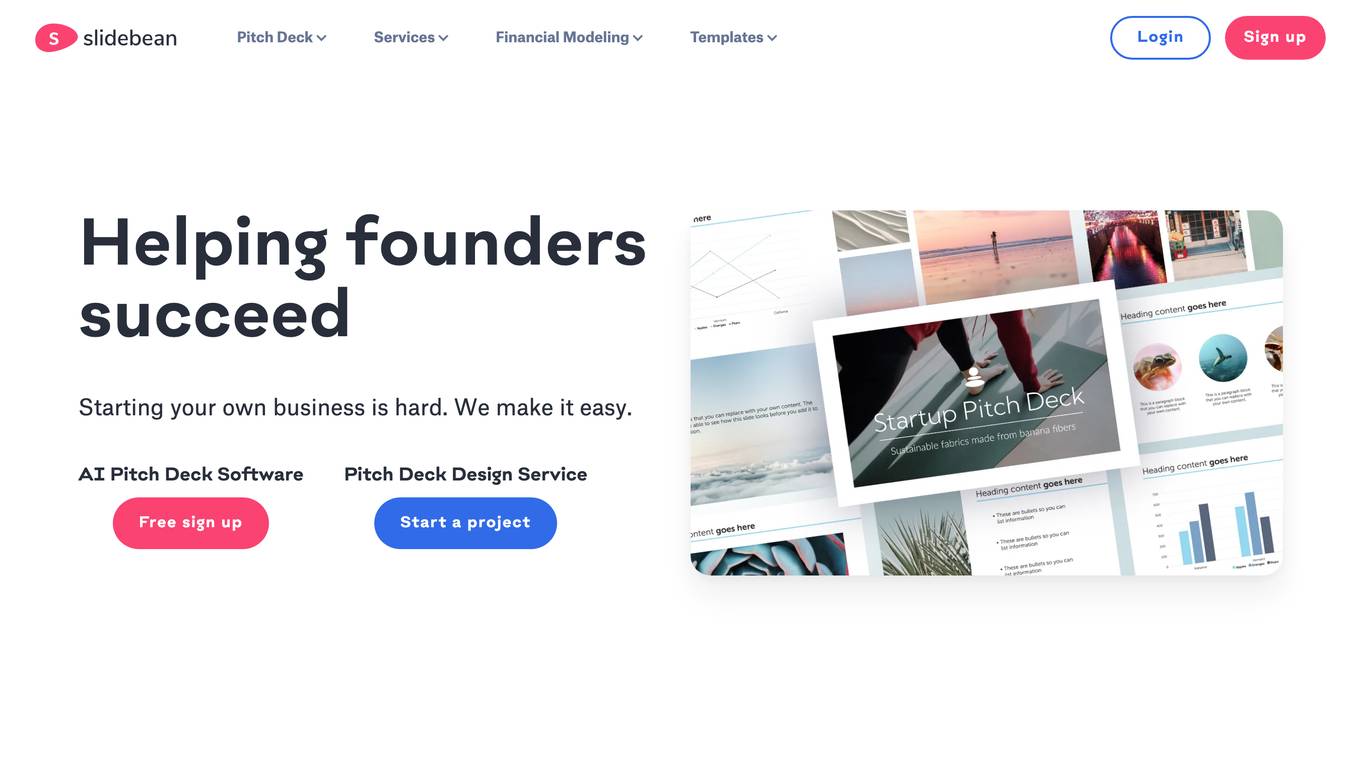
Slidebean
Slidebean is an all-in-one pitch deck software that helps startups create professional and visually appealing pitch decks to raise funds from investors. It offers a range of features including an AI-powered pitch deck builder, collaboration tools, automated design, and analytics. Slidebean also provides pitch deck services where a team of experts helps founders with writing, design, financial modeling, and go-to-market strategy.
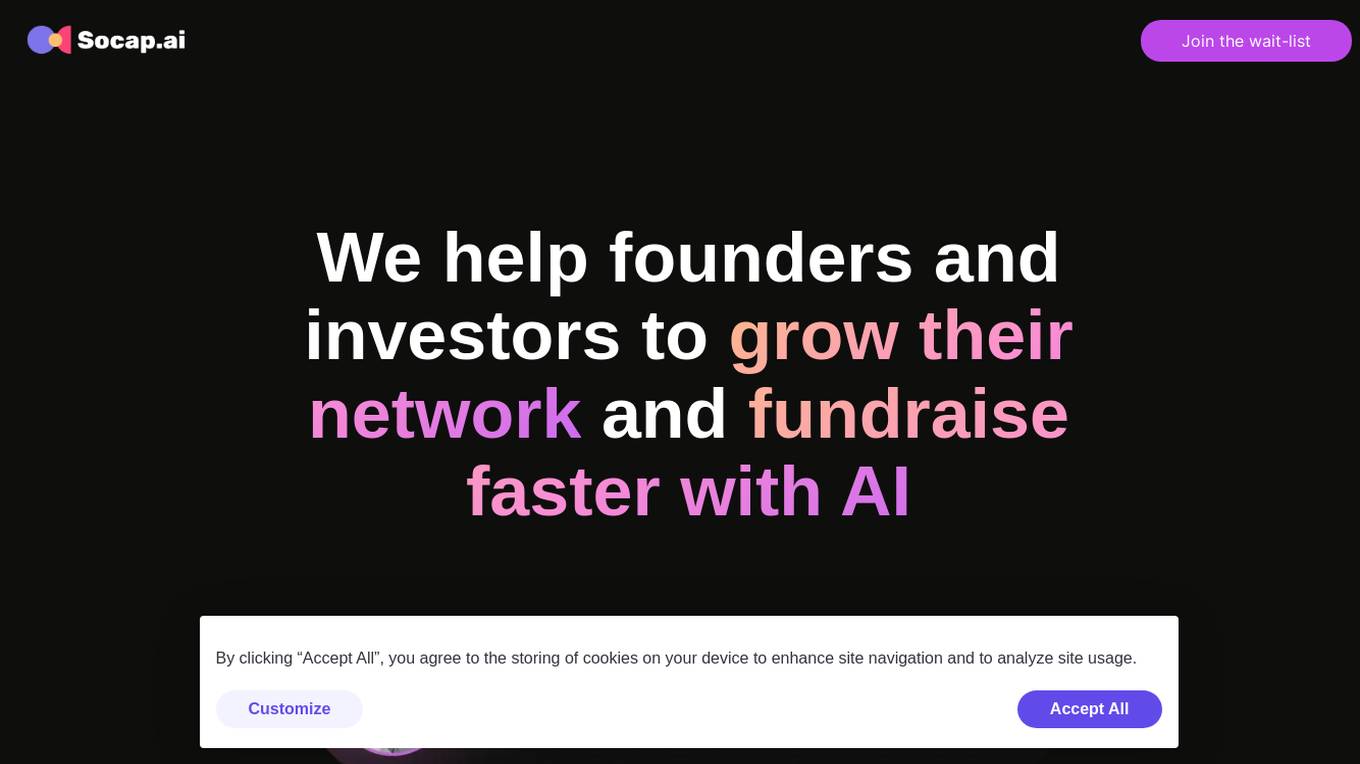
Socap.ai
Socap.ai is an AI-powered platform designed to help founders and investors grow their network and fundraise faster. The platform offers a comprehensive solution for managing and leveraging social capital, providing users with tools to connect with relevant VCs and founders, orchestrate introductions, and build relationships. Socap.ai utilizes machine learning algorithms to match users with the most relevant connections, making it easier to navigate the fundraising process and engage with potential investors. The platform also features a community aspect, where top industry founders share their experiences and invest their social capital in promising startups. With a focus on building networks and facilitating introductions, Socap.ai aims to streamline the fundraising journey for early-stage companies.
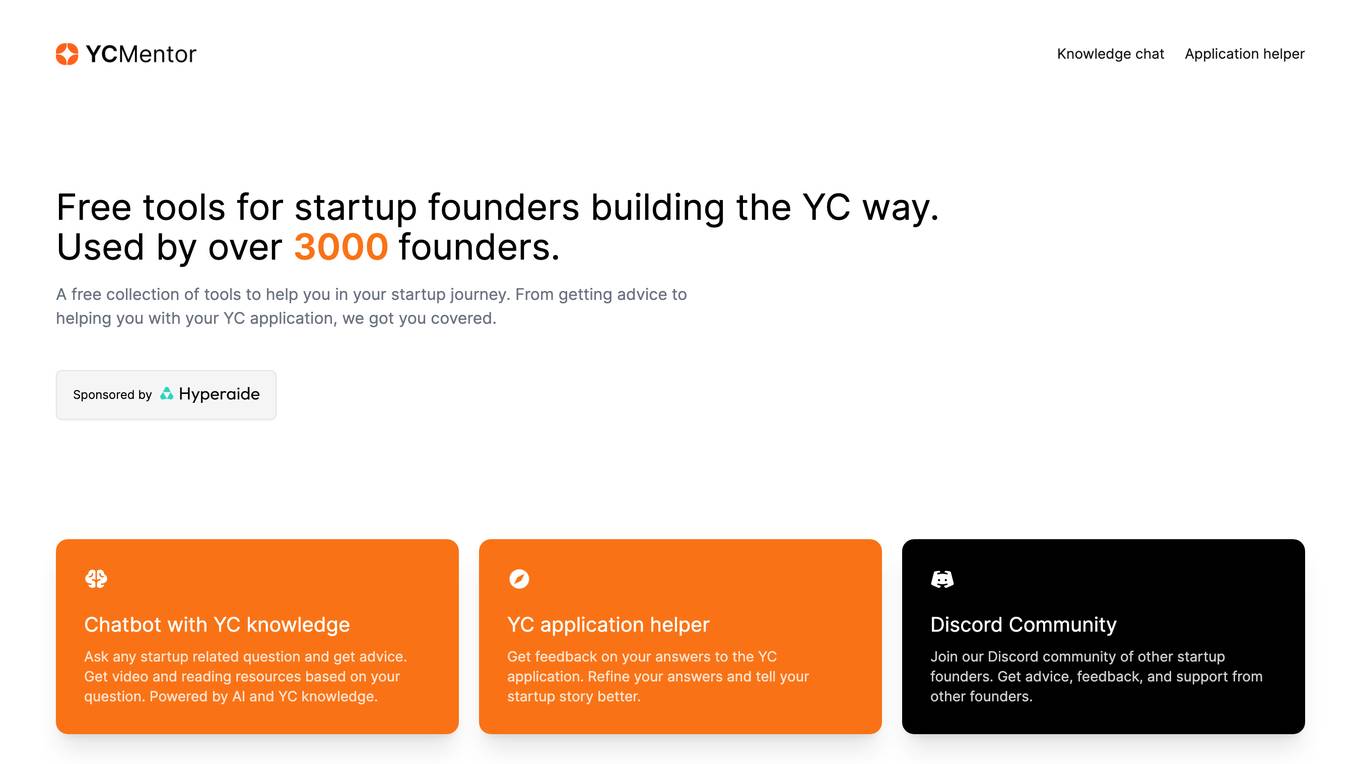
Ycmentor
Ycmentor is an AI tool designed to assist founders in building their startups the YC way. It offers an AI-powered YC Application Helper that provides guidance and feedback on Y Combinator applications. With easy sharing options and support from other founders, Ycmentor aims to streamline the application process for aspiring entrepreneurs. The platform is built and maintained by @dqnamo.
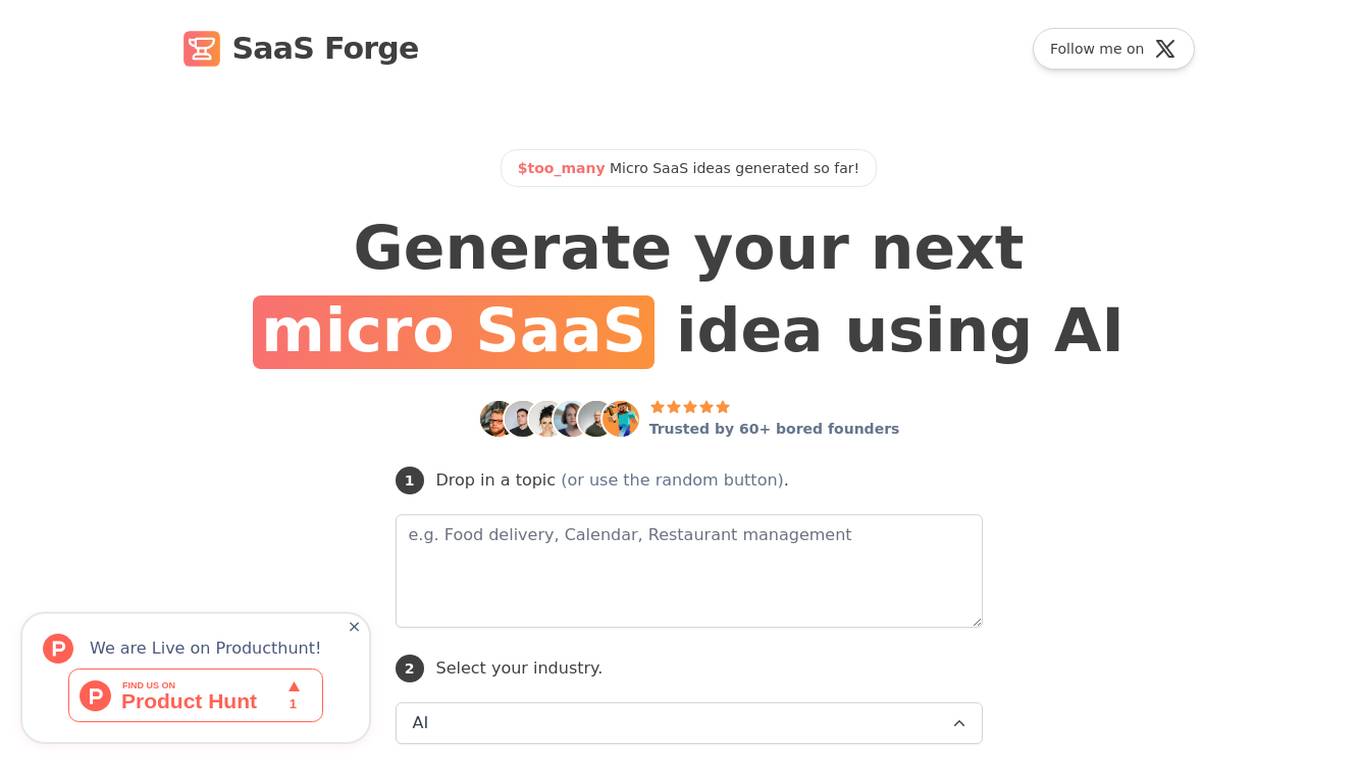
SaaS Forge
SaaS Forge is an AI-powered tool that helps users generate micro SaaS ideas quickly and easily. It allows users to input a topic or use the random button to generate ideas, select their industry, and then receive AI-generated suggestions for their next micro SaaS project. The tool is designed to assist bored founders in finding inspiration and kickstarting their entrepreneurial journey. SaaS Forge is currently trusted by over 60 founders and is live on Producthunt. It is powered by Mixtral and built with love. The tool aims to streamline the idea generation process for aspiring entrepreneurs.
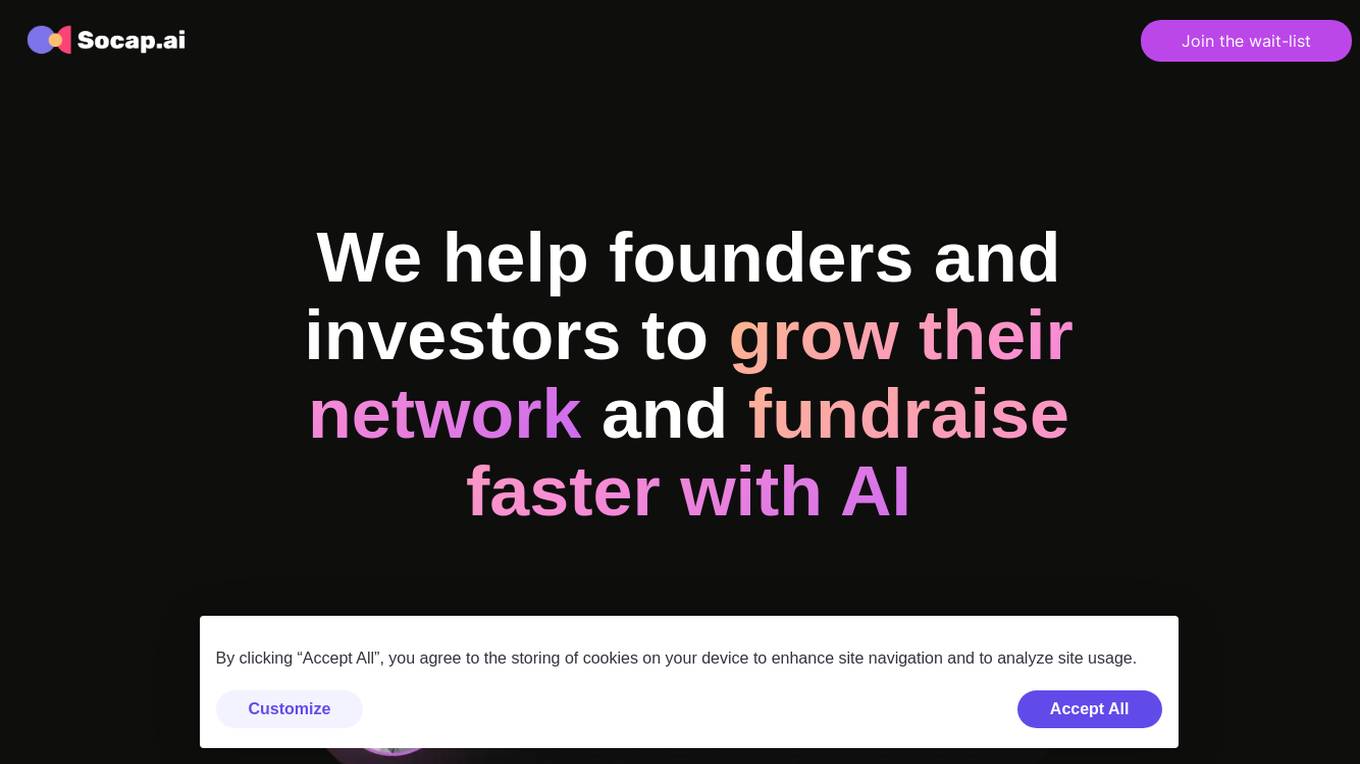
Socap.ai
Socap.ai is an AI-powered platform designed to help founders and investors grow their network and fundraise more efficiently. The platform offers a comprehensive set of tools to manage and expand social capital, providing personalized guidance, relevant introductions, and networking opportunities. By leveraging machine learning algorithms, Socap.ai streamlines the fundraising process, enabling users to connect with top industry founders and VCs, share social capital, and access exclusive resources to enhance their fundraising efforts.
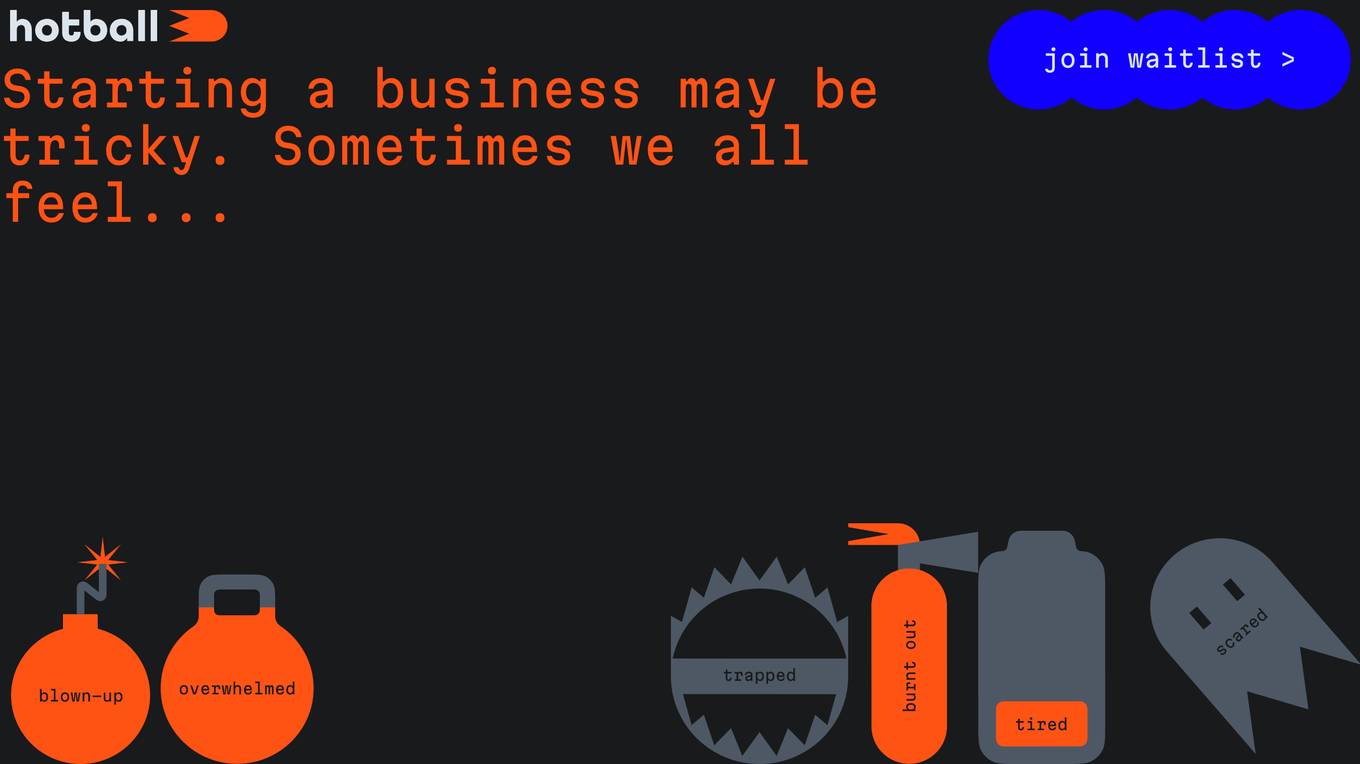
Hotball.ai
Hotball.ai is an AI-powered platform designed to help startup founders validate their business ideas and create a step-by-step plan. By leveraging AI technology, Hotball.ai assists in identifying blind spots, gaps in business plans, and provides guidance to enhance understanding and pitch preparation. The platform offers personalized AI fractional executive services, data-driven suggestions, proven business frameworks, and eliminates the need for filling out boring forms. With Hotball.ai, founders can pre-validate their business models, increase their chances of securing funding, and connect with a community of like-minded entrepreneurs.
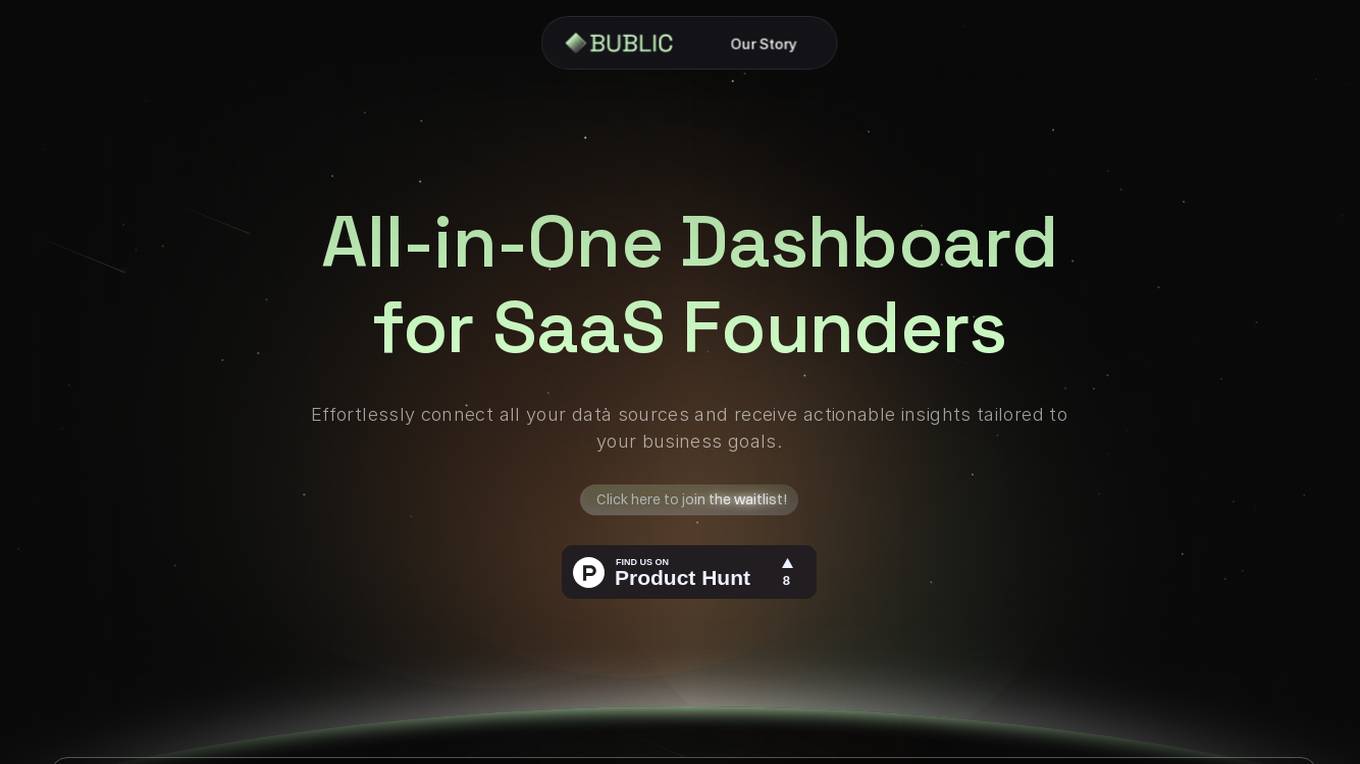
Bublic
Bublic is an AI-driven all-in-one dashboard designed for SaaS founders to effortlessly connect multiple data sources and receive actionable insights tailored to their business goals. The platform addresses the challenge of data fragmentation across various tools and platforms, providing users with clear and growth-focused decision-making support. With features like AI-driven insights, one-click integrations, tailored dashboards, powerful filters, and data-driven decision-making, Bublic empowers SaaS businesses to make informed decisions and drive growth.

Nume
Nume is an AI CFO application designed for startup founders to manage their finances efficiently. It offers features such as monitoring financial data, generating reports instantly, providing insights, drafting detailed updates, and answering financial questions. Nume aims to alleviate the financial worries of founders by automating financial tasks and providing valuable insights to help businesses grow.
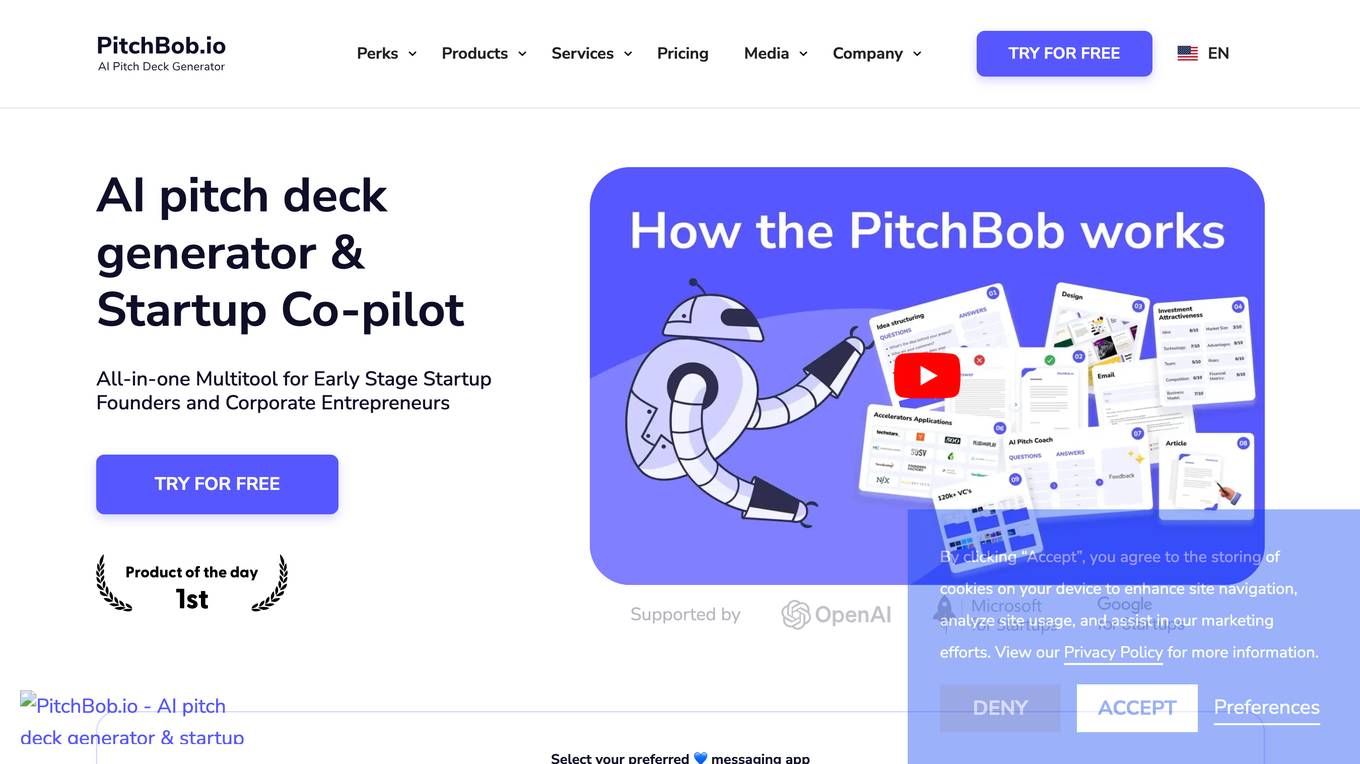
PitchBob
PitchBob is an AI-powered platform that helps entrepreneurs and startups create professional pitch decks, business plans, and other essential documents. It offers a range of features, including AI-generated content, customizable templates, and expert guidance, to help users present their ideas effectively to investors and other stakeholders. PitchBob also provides access to a network of investors, accelerators, and other resources to support startups in their growth journey.
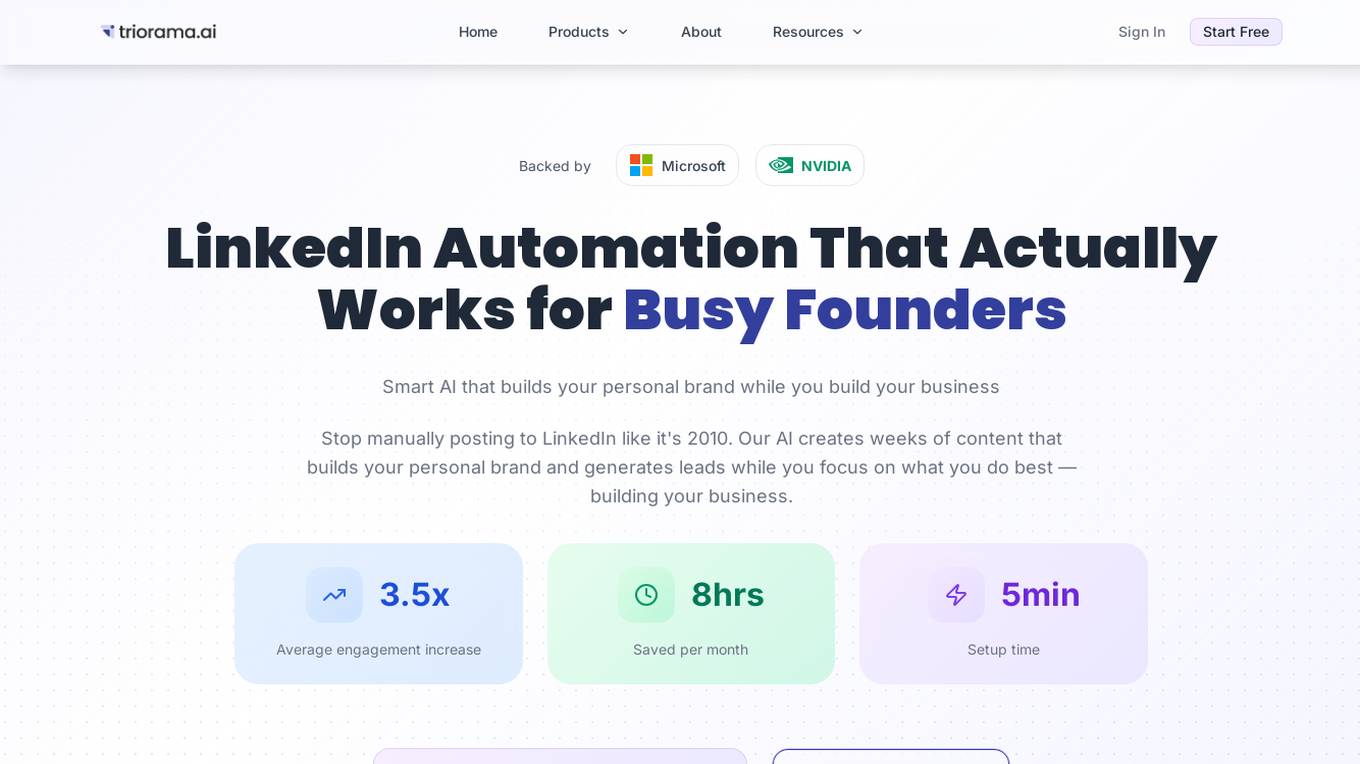
Triorama AI
Triorama AI is an AI-powered LinkedIn automation tool designed for busy founders to build their personal brand effortlessly. The tool generates weeks of authentic content, schedules posts at optimal times, and provides engagement analytics. It learns your voice, writing style, and industry expertise to create posts that sound authentically you. Trusted by founders at various companies, Triorama AI helps transform users from LinkedIn lurkers to thought leaders in just 30 minutes.
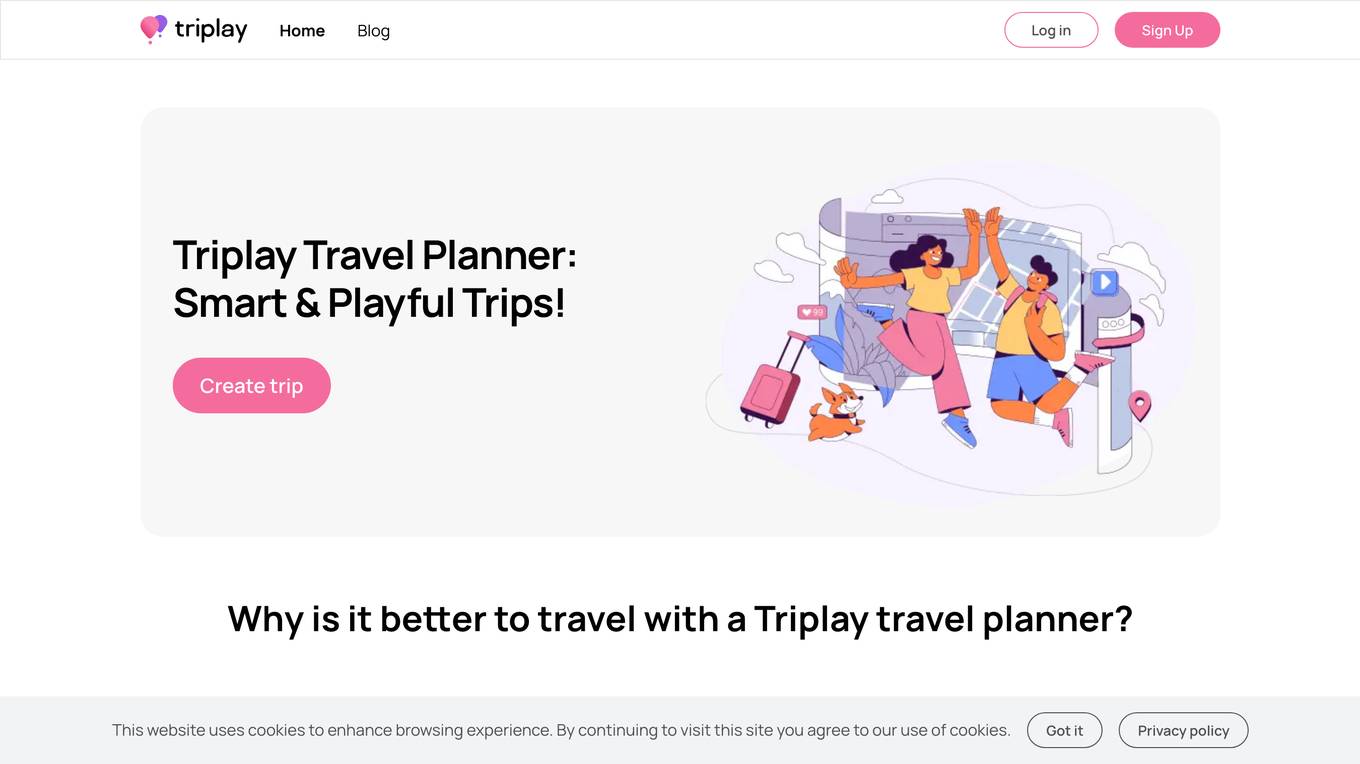
TripTip Travel Planner
TripTip Travel Planner is a smart and playful travel planning application that utilizes AI technology to create personalized itineraries for users. The tool allows users to design their ideal journey step-by-step by entering their destination, trip dates, type of trip, and interests. It offers a unique level of personalization, generating the best itineraries and recommendations tailored to individual preferences. With TripTip, users can explore worldwide destinations with personalized insights, enhance their adventure with AI-enhanced maps, and stay connected anywhere with offline access. The application aims to make every trip unique and unforgettable by providing detailed trip information and optimizing routes.
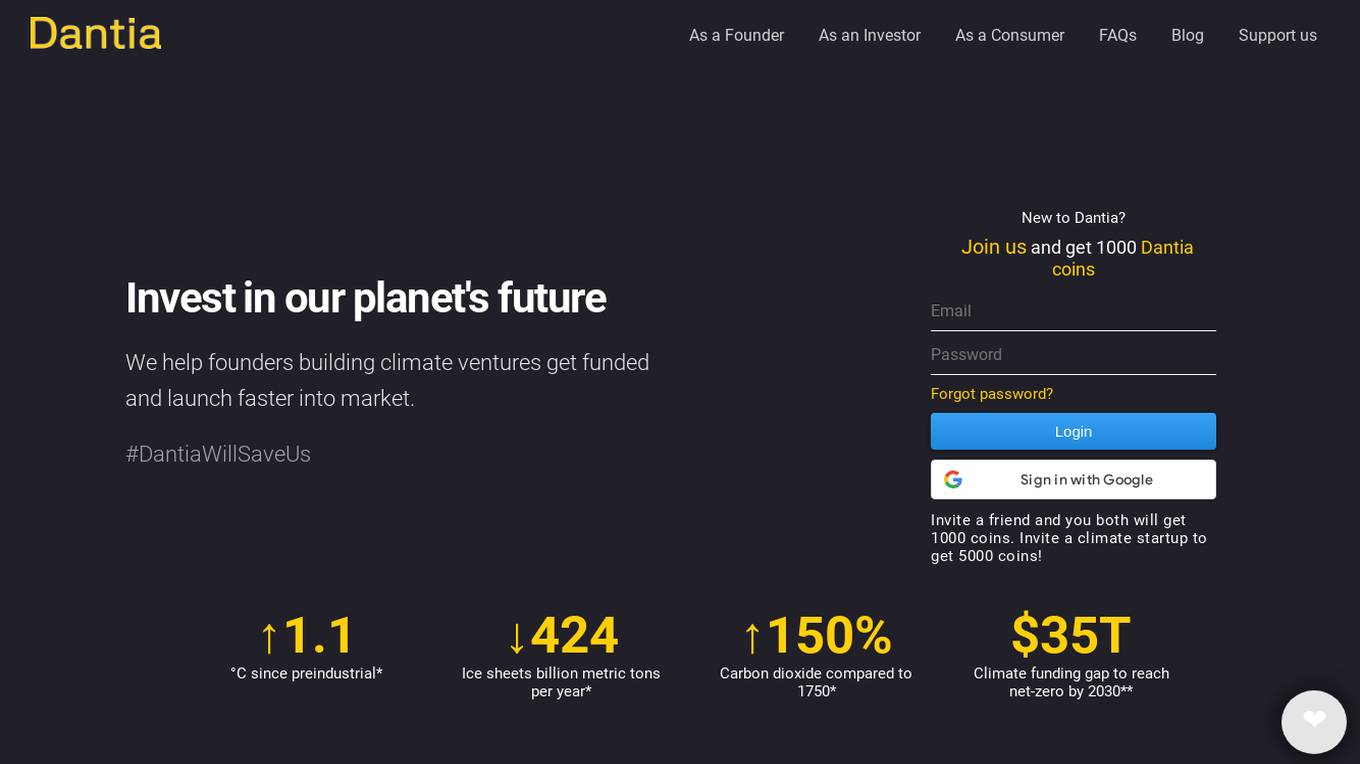
Dantia
Dantia is an AI-powered investment platform that focuses on helping founders build climate ventures by providing them with the necessary capital and resources. The platform connects founders with climate-conscious advisors, early adopters, and corporations to accelerate the launch of sustainable solutions. Dantia also caters to investors looking to support climate startups globally and consumers interested in backing climate-positive companies. By leveraging AI technology, Dantia offers personalized opportunities based on user preferences, making decision-making easier and more efficient.
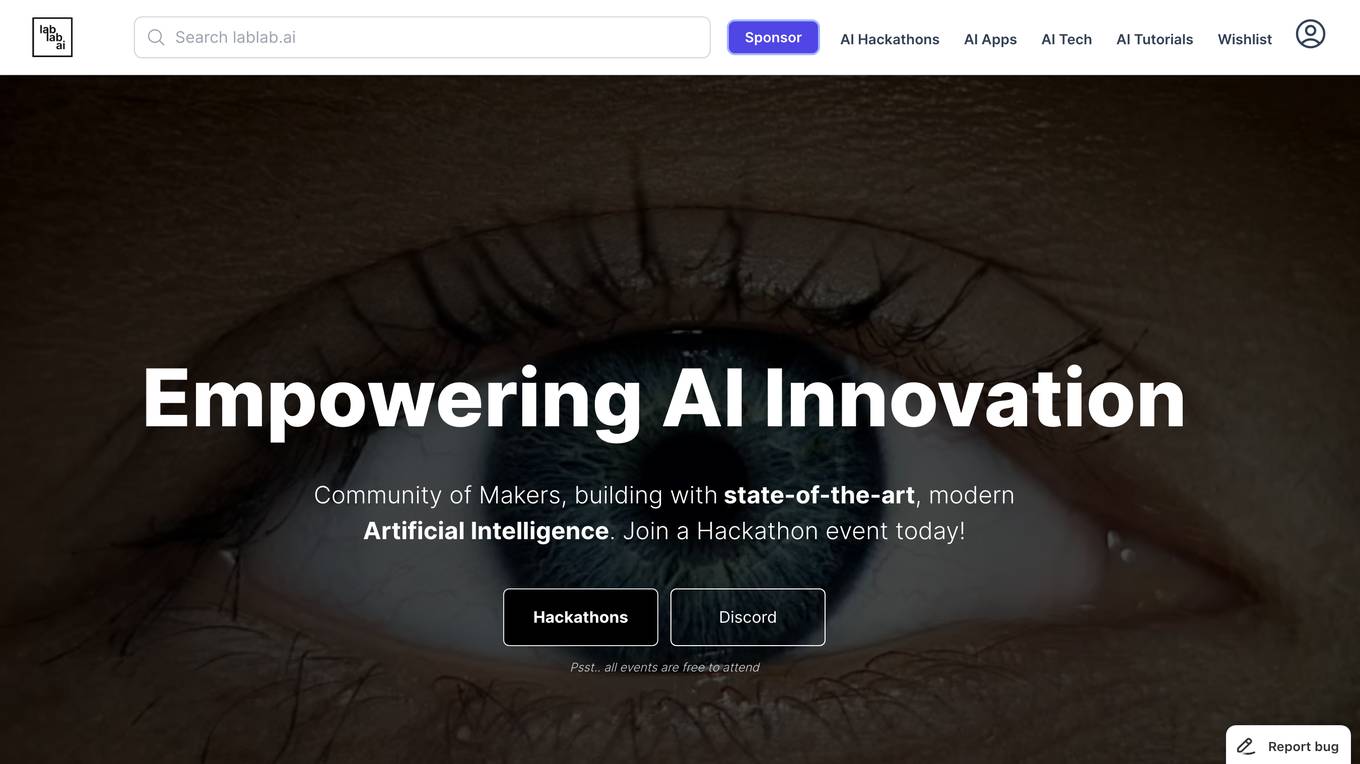
LabLab.ai
LabLab.ai is an online community and platform for artificial intelligence (AI) enthusiasts, developers, and innovators. The platform hosts AI hackathons, provides access to state-of-the-art AI technologies, and offers educational resources on AI. LabLab.ai aims to foster collaboration and innovation in the AI field and to make AI accessible to everyone.
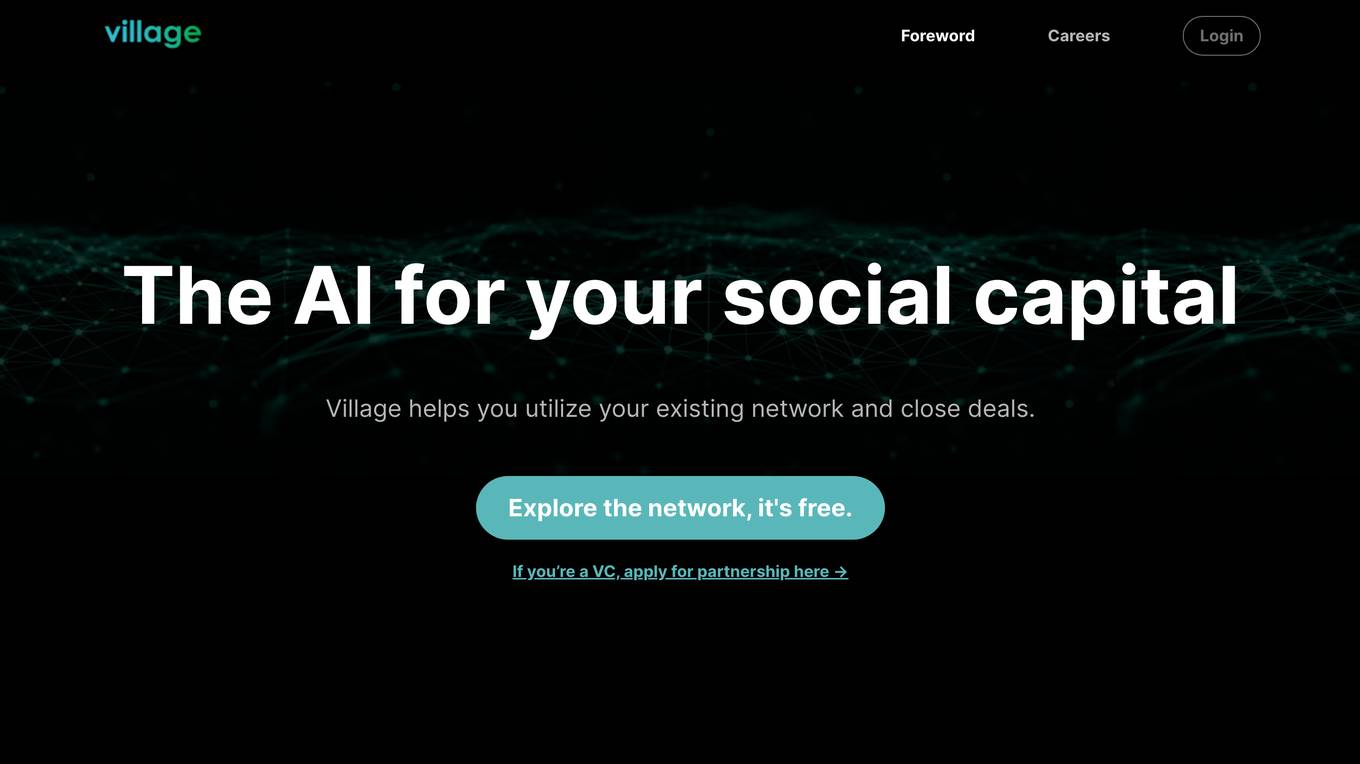
Village
Village is an AI-powered platform that helps you build and manage your social capital. It provides you with the tools and insights you need to connect with the right people, build strong relationships, and achieve your goals.

Kroma
Kroma is an AI-powered platform that offers expert PowerPoint slides for businesses and startups. It provides smart templates, AI features, and expert content to help users create persuasive pitches, showcase ideas, present data, and propose B2B services. With Kroma, users can easily create eye-catching charts and graphs, access a wide range of creative assets, and utilize data visualization tools to enhance their presentations.
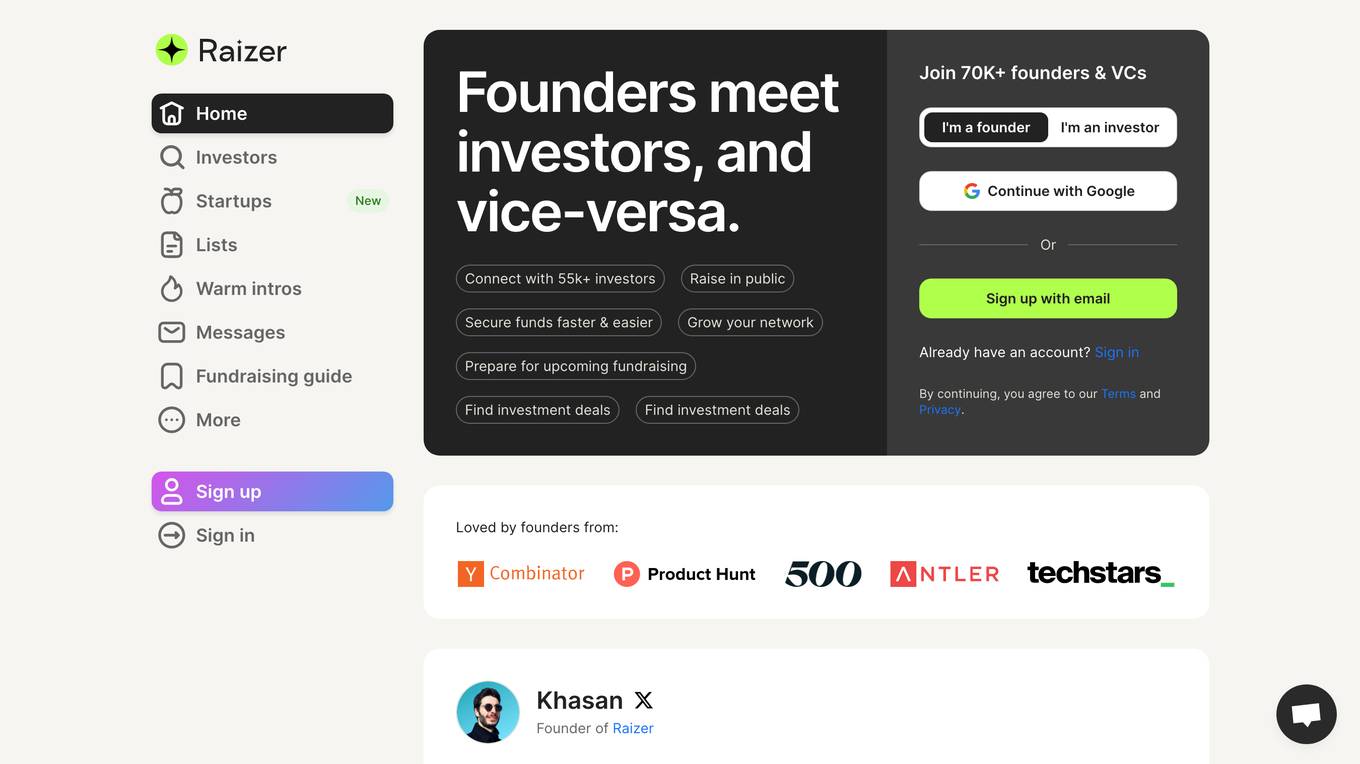
Raizer
Raizer is an online platform that connects startups with investors. It offers a variety of features to help startups raise capital, including a database of over 55,000 investors, AI-powered outreach tools, and warm intro requests. Raizer also provides resources and guidance to help startups prepare for fundraising, such as a fundraising guide and tips from experienced founders.
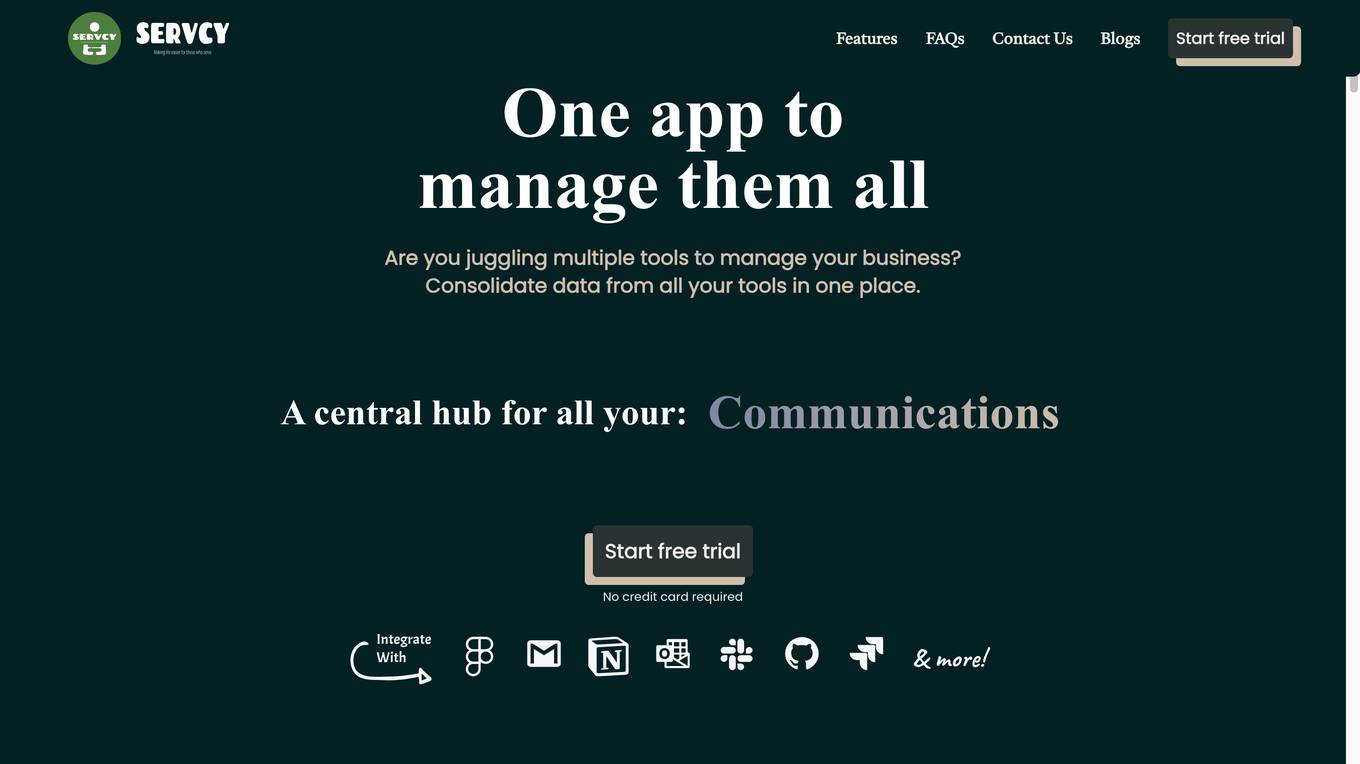
Servcy
Servcy is an all-in-one business management tool that helps you consolidate data from all your tools in one place. With Servcy, you can manage your communications, tasks, documents, payments, and time tracking all in one place. Servcy also uses AI to help you prioritize and respond to the most important messages, organize and manage your tasks, and get answers from your documents.
0 - Open Source Tools
13 - OpenAI Gpts

FoundersGPT
Learn from history's greatest entrepreneurs with deep insights and engaging storytelling.
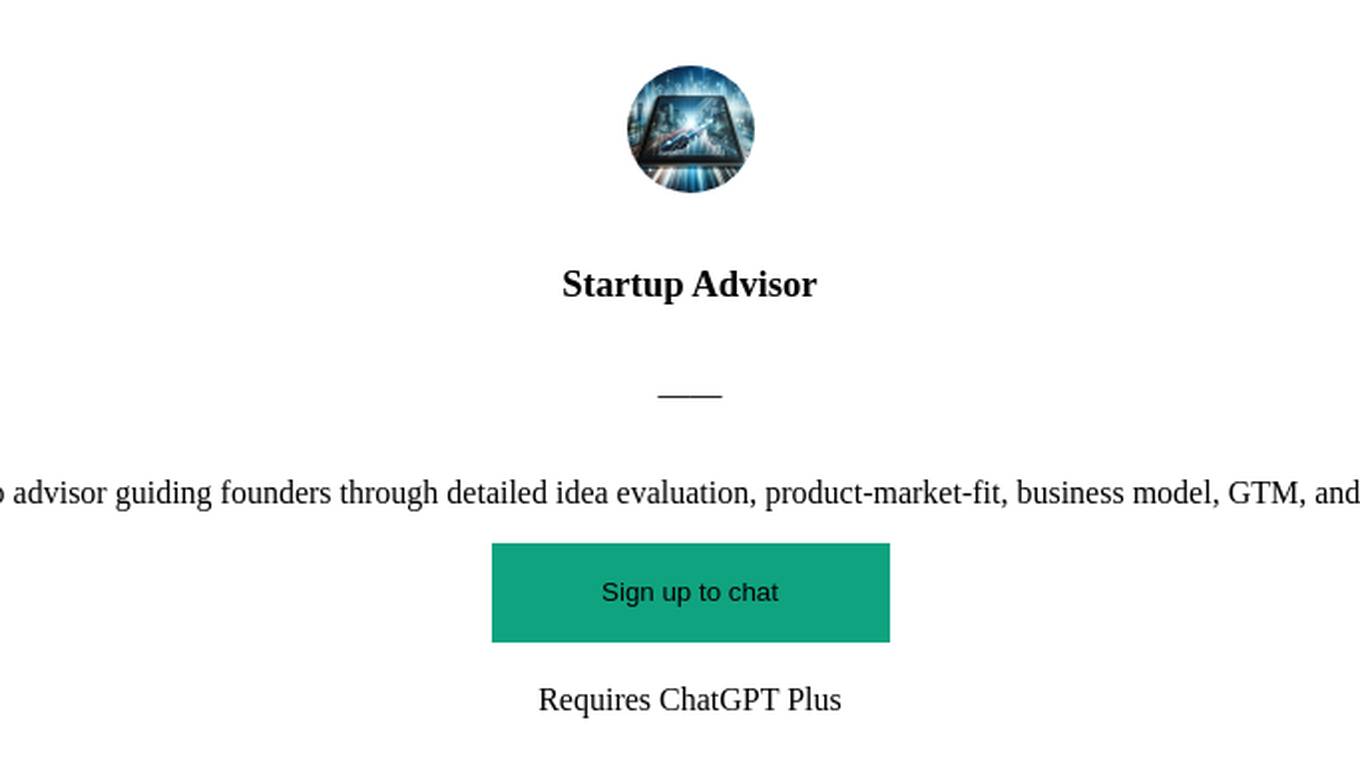
Startup Advisor
Startup advisor guiding founders through detailed idea evaluation, product-market-fit, business model, GTM, and scaling.
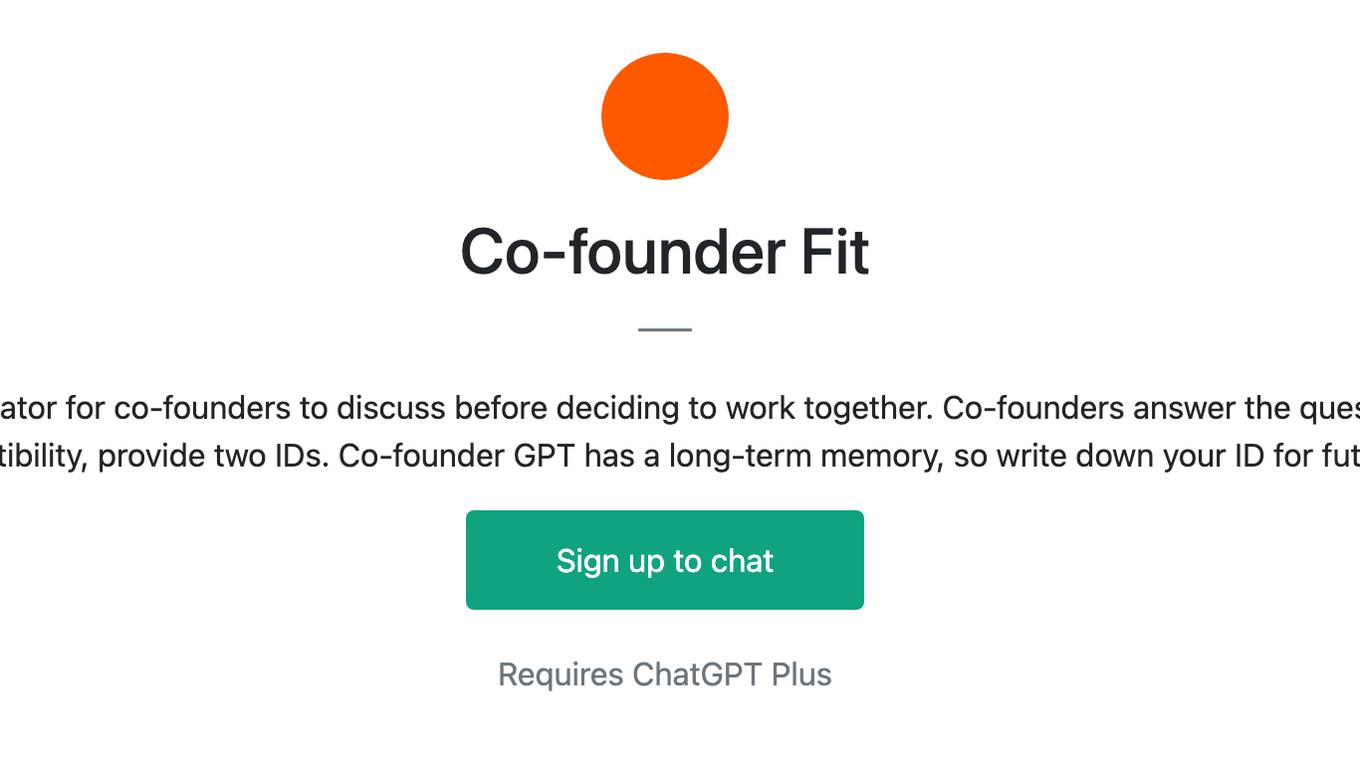
Co-founder Fit
This GPT follows 10 questions from Y Combinator for co-founders to discuss before deciding to work together. Co-founders answer the questions separately and receive unique IDs. To check compatibility, provide two IDs. Co-founder GPT has a long-term memory, so write down your ID for future checks.

MiniVC
This is the AI version of David Teten of Coolwater Capital. David is Founder of PEVCtech.com, FoundersNextMove.com, and VersatileVC.com.
